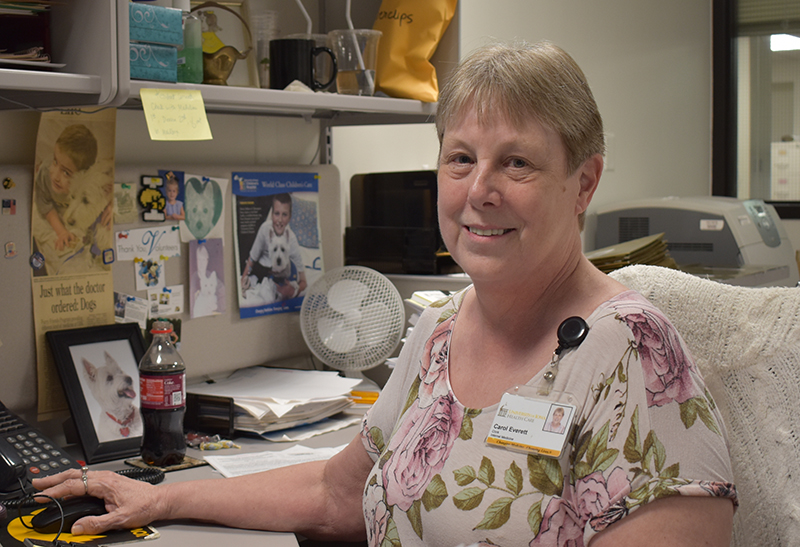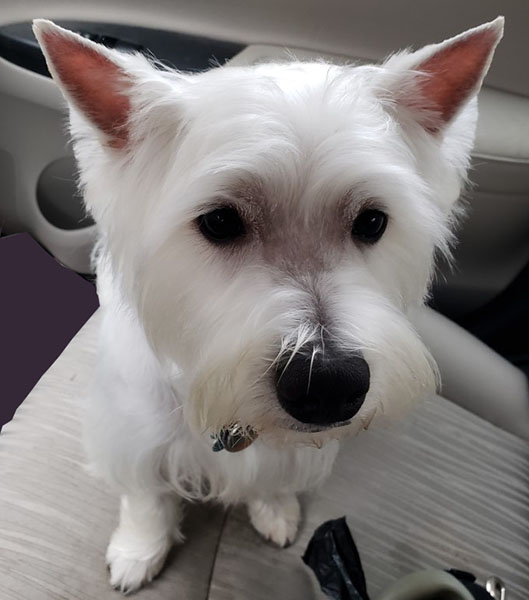If University of Iowa Health Care was an organism, Carol Everett could be thought of as an essential part of its nervous system. As a member of the Chart Control team for Internal Medicine for more than 30 years, Everett has ensured critical patient information moved throughout the institution, ensuring providers have exactly what they needed to provide accurate diagnoses and treatments. Everett also ensures that any new information is stored effectively for future retrieval.
Given that many years in the role, the methods and tools Everett has used to transmit that information has changed significantly. Whether it was stacks of one patient’s record filling an entire cart or troupes of beeper-wearing students flying from one corner of the hospital to the other, Everett has helped shepherd and manage that flow of information.
Originally from Des Moines, Everett began her post-secondary career at Simpson College in Indianola before transferring to the University of Iowa. “My family have always been Hawkeye fans,” she said. After her BA, she completed a Master’s in Communications focusing on development support for humanitarian missions. Everett studied how best to prepare volunteers for overseas travel, providing them with enough cultural education to be successful in their efforts and avoid inadvertently creating barriers.
Initially, post-Master’s, Everett returned to Des Moines in search of work but a couple connections brought her back to Iowa City. She had worked while in grad school in Burge and Daum Halls and knew the university was a good employer. Everett’s first role was in an OB-GYN clinic in a front-line desk role, checking in patients, which she enjoyed. “I like meeting people,” Everett said.
 It was not long before an opening came up in Internal Medicine’s Chart Control, and Everett transitioned from the front lines to behind the scenes. Her role then is largely the same as it is now, she says, the only thing that has changed are the tools. When she started, records were tracked with the INFORMM system, barcodes were scanned and a patient’s next appointment could be tracked, indicating where the record needed to be sent.
It was not long before an opening came up in Internal Medicine’s Chart Control, and Everett transitioned from the front lines to behind the scenes. Her role then is largely the same as it is now, she says, the only thing that has changed are the tools. When she started, records were tracked with the INFORMM system, barcodes were scanned and a patient’s next appointment could be tracked, indicating where the record needed to be sent.
Now, although there is less paper, there is still plenty to keep track of. Hard copies of documents, such as clinical notes, arrive from outside institutions in the mail or by fax with regularity and must be matched and scanned into the proper record. When patients bring lists of medications or previous discharge paperwork, it is Everett’s task to ensure this critical information is available to the next provider reviewing the record.
Everett sees the benefits that digitizing patient records has brought to the system, particularly accuracy, speed, and safety. She recalls a time many years ago that a missing patient record turned up in the laundry, tucked into a patient’s bedding. But, she says, “communication between departments has been lost.” With fewer face-to-face interactions between teams, opportunities for collaboration, she explains, have decreased as well. “But,” she laughs, “you look back and think, ‘Wow, we really did used to do just crazy amounts of running around.’”
In recent years, Chart Control has also assumed responsibility for managing the volumes of mail that the department receives. This helps scratch Everett’s itch to solve mysteries, tracking down the proper recipient because of an illegible label or a doctor who is gone. But she and her colleagues divide up the work, distributing the mail for nearly a thousand people to their correct divisions. “I never knew there were so many medical magazines,” she said.
Those colleagues deeply value working with Everett. Norman Anderson has worked alongside Everett for 25 years. He praises her willingness to take on any task and to talk Hawkeye sports. Carol Reif agrees. “No matter what changes took place over all these years,” Reif said, “she tackles anything that is given to her.” Faramarz Shahsar echoed his colleagues and mentioned how she used vacation time to pursue one of her passions, volunteering with the Furry Friends program.
Up until he passed away a couple years ago, Looby accompanied Everett on regular visits to the University of Iowa Hospitals & Clinics to bring some furry friendliness to recuperating patients. The two of them visited Pediatrics, Psychiatry, and Neurology, each patient’s healing quickened a little with something that only Looby could offer. Sometimes just comfort, sometimes the opportunity to practice hand-eye coordination with some brushing. Looby, Everett said, “helped them forget for a little while that they were in a hospital.” She’s already beginning plans to acclimate her new dog, Misty Lou, to offering the same comfort.

Though Everett does not want to predict what new innovations are next in her work, she has been grateful to watch the progression over the last 30 years. “I do enjoy what I do. Never bored. As things change and you take on new tasks and challenges, you make your own structure. It’s just a good job.”

